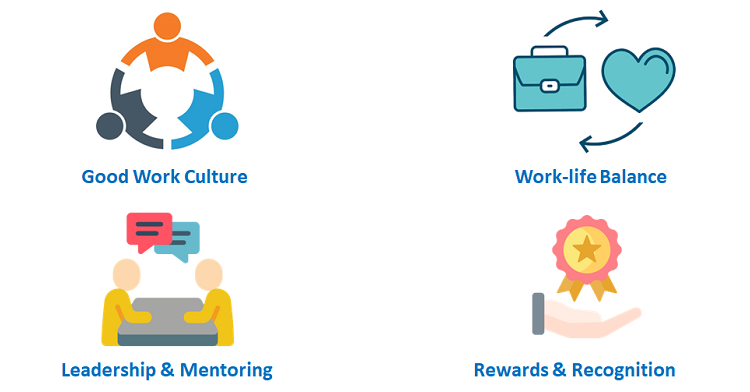1. Develop a Strong Organizational Culture: Create a culture that aligns with millennials’ desire for meaningful work, growth, and development opportunities beyond financial benefits.
2. Offer Great Work-Life Balance: Provide flexible work schedules, remote working options, and other initiatives to balance professional responsibilities and personal life.
3. Invest in Effective Leadership and Guidance: Foster a leadership style emphasizing mentorship, trust, and support rather than micromanagement, as millennials value learning and growth over traditional authority.
4. Implement an Effective Recognition Program: Establish a program that offers timely and meaningful recognition to millennials, ensuring they feel valued and appreciated for their contributions.
Workplaces worldwide have been changing—one significant change is the entry of millennials or those born in the late nineties or the new millennium.
With studies indicating that this generation is likely to comprise 75% of the workforce by 2025, it has become imperative for organizations to master the skill of effectively managing millennials at work.
However, studies also indicate that most organizations might not have sufficient knowledge and insights into how this generation behaves and operates in the work environment.
Hence, managing millennials in the workplace becomes even more challenging for such organizations and can threaten their overall productivity and growth.
First and foremost, organizations need to understand and acknowledge that millennial employees significantly differ from employees of other generations.
They belong to an age group that has been born and brought up in an era of a technological revolution.

Unlike Gen Y and Gen Z who have experienced life both with and without modern technologies as they have grown up, for millennials technology is an integral part of life. This makes them innovative and tech-savvy.
At the same time, they have a strong competitive spirit, and they desire to excel in whatever they do.
They can also be entitled, lazy, wilful, and impatient, with unrealistic exceptions.
According to management experts, managing millennials at work is more about developing the right work environment.
Discussed below are a few practical strategies that organizations can find beneficial in this context:
1. Work Towards Developing Strong Organization Culture
2. Offer Great Work-life Balance
3. Invest In Effective Leadership And Guidance
4. Have An Effective Recognition Program


Unlike professionals from earlier generations, millennials seek meaningful career opportunities that go beyond immediate financial benefits.
They are passionate about their growth and development and that of their organization.
Hence, they feel most happy and satisfied while working for organizations with strong work culture.
They feel such organizations will likely offer them opportunities to achieve, grow, and enhance their skills.

As mentioned before, millennials are passionate about their work. However, they are equally passionate about living a fulfilling life outside their workplace.
That is why they feel more contented to work with organizations that offer a great work-life balance.
Many millennials prefer remote working setups or flexible work schedules that provide better work-life balance.
Rather than being stuck inside the office, millennials want to use technology for remote working while enjoying their lives.

Additionally, it is a well-acknowledged fact that millennials have little tolerance for traditional authority structures.
However, this does not mean that they shun effective leadership and guidance.
Rather the people belonging to this generation want leaders who can mentor and guide them to improve their abilities.
Therefore, they dislike leaders who are habituated to micro-managing their team, as this gives them minimal learning and development opportunities.
They are respectful of leaders who trust them and provide them with the requisite support only when sought.

There is a visible generation gap between millennials and older professionals regarding recognition of their work and efforts.
Unlike their predecessors, millennials want timely and appropriate recognition from their organizations.
Organizations that lack an effective employee recognition program will most likely face trouble in effectively managing their millennial workforce.
Therefore, they feel assured that their work is valued because it is appreciated by the people who matter the most.
Managing millennials in the workplace requires a clear understanding of their behaviors and aspirations. Organizations can leverage their strengths to drive business growth and profitability.

Lead author: Sagar Chaudhuri, the Co-Founder and CEO of HiFives. He is an HR Tech Evangelist with over 25 years of corporate and entrepreneurship experience. In the past, Sagar has worked in leadership roles with companies such as Genpact, Infosys, and ICICI Bank. He has an engineering degree from IIT Kharagpur and an MBA from IIM Lucknow. Connect on LinkedIn
To stay updated on the latest HiFives blogs, follow us on Twitter (@MyHiFives)